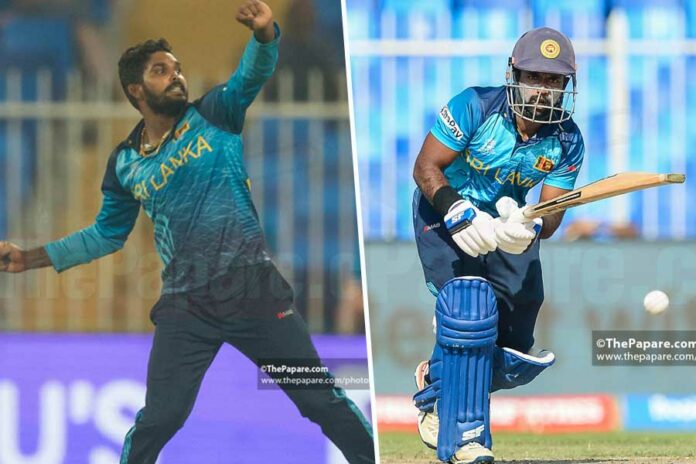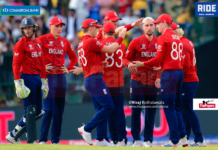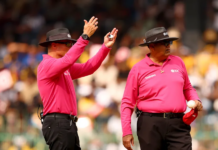The selection panel with the unenviable task of narrowing it down to just 11 players on the team sheet and a 12th in reserve were commentators Ian Bishop, Natalie Germanos and Shane Watson, and journalists Lawrence Booth and journalists Shahid Hashmi.
Before we look at the XI, a word from Ian Bishop on the selection process:
“As with any team selection there will be varying opinions, and robust discussion on the final composition of the squad,” Bishop said. “The panel respects that, and we encourage the strong debate that will ensue.
“This team was incredibly difficult to select over such a highly competitive tournament. Selections were based predominantly on the Super 12 onward to the final.
“As a panel we felt that the combination of runs plus strike rate plus match impact for batsmen, to be decisive factors. We endeavoured to select players as close to their initial team position where possible. This intention was not always a reality, as some compromises had to be made.
“The top three in the order were so outstanding that we could not leave any of them out. Notable absentees include Mohammed Rizwan who was simply outstanding and courageous in his performance. However, we could not fit him into the team too far outside of the opening position where he is most suited and successful, nor ahead of those selected.
“The panel also saw the impressive young talent of Charith Asalanka and Aiden Markram as a real bonus for the team and their countries in this tournament.
“Moeen Ali was selected as that utility all-rounder who could be applied with the bat to various match situations and innings requirements. He also offered a more than substantial bowling option.
Read more: Australia crowned ICC Men’s T20 World Cup winners
“The bowling group was felt to select itself. Three seamers who excelled and two outstanding leg spinners in Hasaranga and Zampa. The panel was impressed with Shaheen Shah Afridi’s bowling at 21 years of age and we felt compelled to institute him as the optional player in the 12-player squad.
“As for the player of the tournament; any of Babar Azam, Jos Butler and Adam Zampa would make a compelling case. In the end, David Warner’s impact over the tournament and into the knockout stage just swayed the panel in his favour. Once again we thank cricket lovers the world over for their insight and debate and accept that there are various methods and criteria to selecting any one team or player. Thanks to the cricketing public for your continued following and love of this great game.”
David Warner
289 runs at 48.16. Strike rate of 146.70.
Australia’s gun opening batter went into this tournament on the back of a relatively lean spell. But there were factors behind that run, as David Warner himself said prior to the World Cup: “I actually think people talking about my form is quite funny. I laugh at the matter. I’ve played hardly any cricket.”
Well, the critics were wrong and Warner was right. And it’s not just the volume of the 35-year-old’s runs that helped Australia through the tournament, but the manner in which he scored them. Warner was at his belligerent best at times, taking the attack to bowling attacks that few others could get the upper hand against. He was pivotal to both of Australia’s victories in the knockout stage. He’s one of the best T20I batters of all time, and World Cup 2021 proved just that.
Jos Buttler
269 runs at 89.66. Strike rate of 151.12.
England’s star man with the bat turned up on the big stage to deliver two breathtaking innings in the Super 12 stage. And even when Jos Buttler didn’t go big, his contributions were not insignificant, with his lowest score across six innings being 18. Buttler’s 71 off 32 balls against Australia was a flexing of muscles that Aaron Finch’s side did well to come back from, it was an obliteration of one of the best bowling attacks in the world, with none of Australia’s premium bowlers spared from Buttler’s vicious strokeplay. His century against Sri Lanka, the only ton by any player at the tournament, was a very different knock, but no less masterful. Buttler rode through a sticky patch on a slow and low Sharjah wicket before hammering his final 51 off just 22 deliveries to bring up his century off the final ball of the innings. Behind the sticks, Buttler was reliable for England throughout too.
Babar Azam
303 runs at 60.60. Strike rate of 126.25.
The numbers speak for themselves: 303 runs, an average of 60.60, four half-centuries in six matches. Babar Azam’s T20 World Cup performance was remarkable. The fact that it was the Pakistan skipper’s first ever T20 World Cup appearance makes his numbers even more astonishing, and he is comfortably the highest run-scorer at a debut World Cup in the history of the competition, beating Pakistan batting consultant Matthew Hayden’s previous record. Babar also drew level with another record held joining by Hayden and Virat Kohli, with his four fifties at a single World Cup equalling the all-time best. The 27-year-old underlined just why he is top of the ICC T20I rankings with the bat, and he has many years and many tournaments ahead of him to set more records.
Charith Asalanka
231 runs at 46.20. Strike rate of 147.13.
Despite bowing out at the Super 12 stage there is more optimism around Sri Lanka right now than there has been in a short while. That is in no small part down to the rise of Charith Asalanka, who was the tournament’s top run-scorer when the island nation exited the tournament. The 24-year-old had an immediate impact on the Super 12, guiding Sri Lanka to victory over Bangladesh with an unbeaten 80 off 49 balls. He backed that up with contributions against Australia, South Africa and England before signing off in style with an impressive 68 off 41 against West Indies. The only team he failed to reach 20 against this tournament was Netherlands in the First Round.
Aiden Markram
162 runs at 54. Strike rate of 145.94.
Playing deeper in the order than some would have expected. Aiden Markram adapted and thrived in his middle-order role. The 27-year-old resuscitated South Africa’s innings against Australia with a gritty 40 off 36 that was almost enough to take them to victory. He backed that up with an unbeaten 51 off 26 against reigning champions West Indies, lifting South Africa’s net-run-rate firmly into positive territory. He saved his best performance for what turned out to be South Africa’s final match, belting 52 off 25 against England.
Moeen Ali
92 runs at 46. Strike rate of 131.42. 7 wickets at 11.00. Economy of 5.50.
A dependable player for England during their campaign, Moeen Ali performed whenever and wherever he was needed. Taking seven wickets in just 14 overs throughout the tournament, Moeen Ali’s off-spin was crucial in Eoin Morgan’s plans, particularly early in the tournament. Exuding a calmness when stepping up, Ali bowled the first over of the innings in all four matches he was thrown the ball, only going for more than a run-a-ball once, in another tight spell of 1/27 against South Africa. Consistent in spells of 2/17, 2/18 and 2/15 on the journey, Ali found form with the bat late in the tournament, making 37 against South Africa, before a professional 51* (37) against New Zealand to carry England to a defendable 166.
Wanindu Hasaranga
16 wickets at 9.75. Economy of 5.20. And 119 runs at 23.90. Strike rate of 148.75.
The top wicket-taker at the ICC Men’s T20 World Cup 2021, Wanindu Hasaranga isn’t just Sri Lanka’s best player, he’s one of the best in the world. The 24-year-old has everything, not just the leg-spinning armoury that helped him take 16 wickets across the tournament, including a hat-trick against South Africa. But also the control and attitude to help tie teams down in the middle overs. He’s a gun fielder too, and with the bat Hasaranga is a crucial part of Sri Lanka’s middle order. It was his outstanding 71, after coming in with the score at 8/3, that set up the Round 1 win against Ireland. And when he was at the crease the chase against England in the Super 12 fixture looked on. When the all-rounder fell for 34 off 21 is when the game felt over. Hasaranga was a lock for team of the tournament for a while, and should be in most people’s T20 World XIs right now.
Read more: Charith Asalanka to lead Sri Lanka President’s XI against West Indies
Adam Zampa
13 wickets at 12.07. Economy of 5.81.
Australia’s leg-spin wizard was essential in their T20 World Cup winning campaign. Impossible to get away throughout the tournament while still posing a serious wicket-taking threat, time and again he turned the tide of an innings through the middle overs. He claimed the best figures of the tournament with his 5/19 against Bangladesh, but his most important performances came in the knockout stages where he put the brakes on both innings.
Josh Hazlewood
11 wickets at 15.90. Economy of 7.29.
Missing Australia’s Cricket World Cup campaign in 2019, Josh Hazlewood showed just why he is an asset in every format at this tournament as he turned the screws with his metronomic bowling. The right-armer’s unerring accuracy saw him take 2/19 off his full allotment in a Player of the Match performance against South Africa, and was similarly effective against Sri Lanka and Bangladesh. He virtually secured Australia’s spot in the semi-finals with figures of 4/39 against West Indies and took the incredible figures of 3/16 in Sunday’s high-scoring final.
Trent Boult
13 wickets at 13.30. Economy of 6.25
Trent Boult has often been at his best in ICC events and so it proved this past month as he topped the wicket-taking charts for seamers with 13 across seven matches. Built on the strength of the collective rather than the success of individuals, New Zealand’s run to the final was one relatively short of standout performers. Boult still stood out. Given the responsibility of bowling through the Powerplay and at the death, Boult’s combination of pace and swing made him Kane Williamson’s go-to man whenever the going got tough with the ball in dewy conditions.
Anrich Nortje
Nine wickets at 11.55. Economy of 5.37
Playing at a T20 World Cup for the first time, Anrich Nortje well and truly left his mark. Arguably the quickest bowler in the tournament, Nortje impressed not with just the sheer velocity of his bowling but his accuracy. Nortje terrorised batters all tournament with unrelenting pace and guile and was pivotal to the Proteas winning four of their matches at the event. No team managed to deny him a wicket, with his performance against the West Indies – 1/14 off his full allotment – in particular standing out.
12th player: Shaheen Afridi
Seven wickets at 24.14. Economy of 7.04
With express pace and ample movement, Shaheen Afridi used his notable talents expertly throughout the tournament. His opening spell against India set the tone for Pakistan’s campaign as he delivered two unplayable balls to knock over Rohit Sharma and KL Rahul with the new ball, before returning to remove Virat Kohli at the death. It earmarked him for the remainder of the event, with team after team doing their best to preserve wickets whenever he was in action. In the semi-final, he got Pakistan off to the dream start with the ball by knocking over Aaron Finch and only missed out on the wicket of Mitchell Marsh immediately after by the barest of margins. He backed himself in the 19th over against Matthew Wade and though he came up short this time, expect him to return an even better bowler.

















